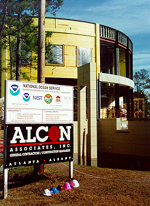Marine research laboratory named for Senator Hollings
First of its kind, the Hollings Marine Environmental Health Research Laboratory draws its strength from collaborationThe Marine Environmental Health Research Laboratory, now under construction at Ft. Johnson, was named for South Carolina Senator Ernest F. Hollings in a ceremony held Dec. 21 at the construction site.
 Sen.
Ernest F. Hollings
Sen.
Ernest F. Hollings
In remarks honoring Hollings, Secretary of Commerce Norman Y. Mineta said, “This building is named in honor of the senator in recognition and appreciation of his lifelong efforts on behalf of this nation’s marine and coastal environments.
“Senator Hollings has been a champion for increasing scientific understanding and protecting our nation’s oceans,” he said.
The Hollings Marine Environmental Health Research Laboratory will be the first of its kind to combine human and environmental health research in one facility. It will house a series of environmental laboratories and be equipped to study harmful algal blooms, shrimp viruses, drug and product development. The laboratory wil also take measurements and document pollutants and their impacts.
In addition, the lab also will house the nation’s largest cryogenic specimen banking facility.
Other labs throughout the nation have some of the same capabilities as the Hollings Marine Research Lab, as it will be called, but no other facility combines all these elements under one roof. In addition to the cryogenic (very low temperature) environmental specimen bank, there will be high quality clean rooms, analytical clean labs, and a facility for producing analytical reference standards.
 Logos
from five collaborating research agencies appear on a sign in front of
the Hollings Marine Research Laboratory.
Logos
from five collaborating research agencies appear on a sign in front of
the Hollings Marine Research Laboratory.
The series of labs in the building include biohazard labs, environmentally controlled challenge labs with a range of seawater conditions and temperature, bioassay labs and aquatic culture labs, and a full range of chemical analytical laboratories. These labs will allow the examination of biological and chemical responses of organisms to simulated natural and man-made conditions.
Scientists from different disciplines will work on projects together and share laboratory space.
By combining human and environmental health research in one facility, scientists from a variety of disciplines will collaborate to learn more about how the environment affects human health and how humans affect environmental health. As the collaboration yields new knowledge of the environment, it will also contribute to advances in human medicine.
MUSC is a joint partner in the marine laboratory project with the National Oceanic Atmospheric Administration, NOAA's National Ocean Service, the S.C. Department of Natural Resources, the College of Charleston and the National Institute of Standards and Technology.
The $23 million project is scheduled for completion in the spring.